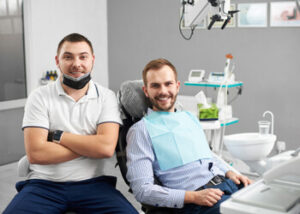While it’s not a desirable procedure, there are times that a tooth extraction is necessary for the betterment of your overall oral health. Dental trauma, broken or chipped teeth, decayed teeth, and wisdom teeth can result in tooth extractions. While many people hesitate to have a tooth removed because they’re wondering, “Does a tooth extraction hurt?” the reality is you are much more likely to experience discomfort from leaving a tooth in your mouth that needs to be extracted.
Dentists can help patients feel comfortable during the tooth extraction procedure using anaesthetic and giving aftercare instructions.
Why You Need a Tooth Extraction?
Regardless of how much effort your dentists make to save your teeth, some infections or injuries may prove untreatable, and a tooth extraction becomes necessary.
Teeth extractions can be done for these reasons, including:
- Gum disease
- Broken teeth
- Infected teeth
- Wisdom teeth issues
Wisdom teeth sometimes need to be extracted if they are impacted below the gumline or are pushing against other teeth in your mouth. They lead to more complications, including infections and misalignment of your teeth.
Does a Tooth Extraction Hurt?
Your dentist will explain what will happen during the tooth extraction procedure to help you better understand the process. There are a few types of anaesthesia the dentist can use to help you feel more comfortable during the extraction.
Local Anaesthetic
The dentist puts a numbing cream and then injects a local anaesthetic into the extraction area to make sure it is numb. You may feel some movement and tugging, but the local anaesthetic can help make you feel more comfortable during the procedure. This anaesthetic is common for general tooth extractions.
Sleep Dentistry

At Available Dental Care, we also offer IV sedation dentistry, whereby a sedative is administered intravenously, putting you into a sleep-like state throughout the procedure. This is an ideal choice for patients with severe dental anxiety. You’re unlikely to remember much from the appointment after the fact, and you should have a friend or family member drive you home.
How to Stay Comfortable After a Tooth Extraction?
General Tooth Extractions
Does tooth extraction hurt after the fact? While you may experience mild discomfort, there are many ways to stay comfortable after the procedure. With general tooth extraction, the amount of aftercare required is significantly less than post wisdom tooth removal.
If you’re having a regular adult tooth pulled, the discomfort at the surgical site should reside after 24 to 72 hours, while the socket should heal in roughly 1-2 weeks. In the hours or days after the extraction, your dentist may recommend taking an over-the-counter anti-inflammatory medication.
To speed up the healing process, keep your physical activity low for the first 2-3 days to allow a blood clot to form at the extraction site. Your gums will be sensitive, so eating soft foods like mashed potatoes is preferable.
Wisdom Tooth Extraction or Surgery
If your extraction is for a wisdom tooth, your dentist will provide specific instructions for aftercare to prevent infection at the surgical site. Discomfort and bleeding are expected in the few days following the surgery; however, if bleeding continues past the first 48 hours, consult your dentist.
As with a routine extraction, you can ice your jaw for 15 minutes at a time to relieve inflammation, and your dentist may prescribe medication for discomfort or inflammation. Avoid physical activity, heavy lifting, and bending over for the first 5-7 days after tooth extraction. These actions can put a strain on the surgical site and restart the bleeding or dislodge the blood clot.
Other actions that can dislodge the clot at the surgical site include:
- Spitting
- Sucking motions (avoid straws)
- Swishing liquid around in your mouth forcefully
A clot becoming dislodged can lead to an unpleasant secondary condition called dry socket (alveolar osteitis) that may prolong healing and create significant discomfort.
Following wisdom tooth extraction, you will also need to avoid certain foods like nuts and seeds, which can become lodged in the empty socket and cause infection. It’s best to avoid extremely hot or cold food and beverages for the first two weeks and stick to a diet of soft foods that require minimal chewing.
It’s also essential to keep your mouth clean, even though you may not immediately be able to brush around the extraction site. Use a saltwater solution at least twice daily to rinse and disinfect your mouth while maintaining a regular brushing and flossing schedule on the rest of your teeth.
Work With the Right Dental Practice to Take Care of You
At Available Dental Care in Campbelltown, NSW, our team of professionals is eager to assist you with any questions about tooth extractions and wisdom tooth surgery. Call us today on (02) 4062 8763 to book your consultation.
Disclaimer: Any surgical or invasive procedure carries risks. Before proceeding, you should seek a second opinion from an appropriately qualified health practitioner.

